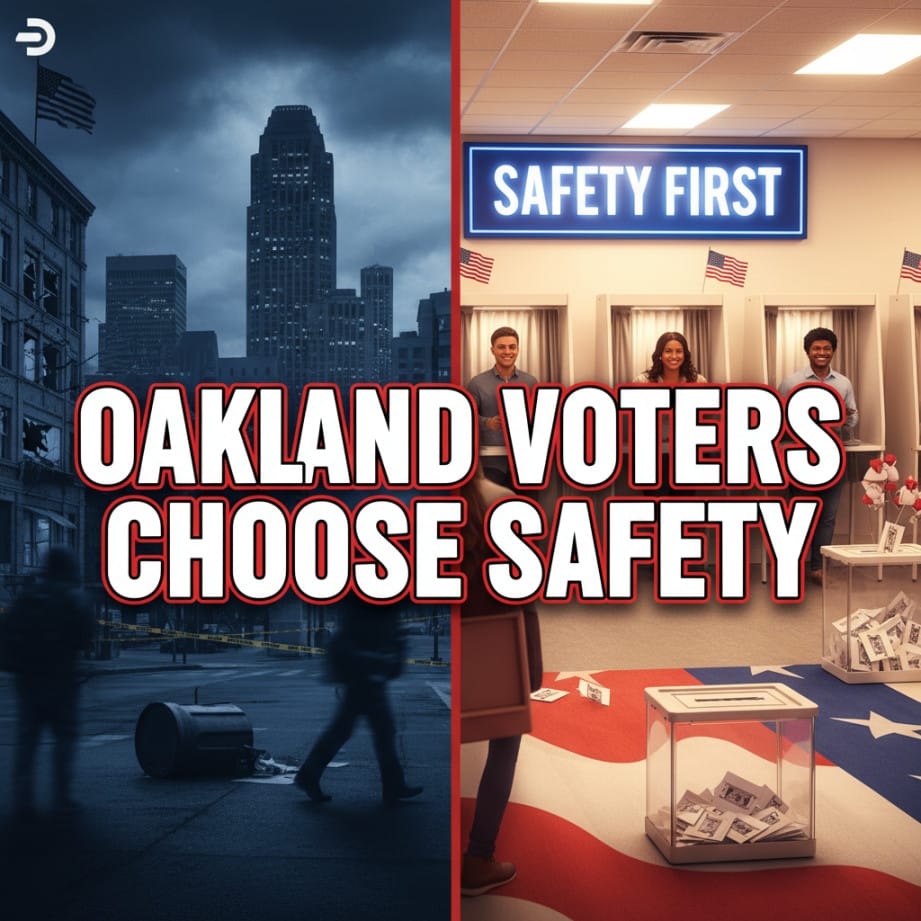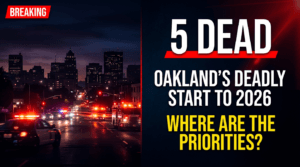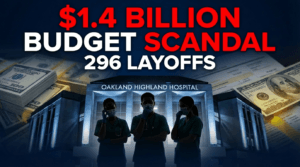Oakland’s Crime Wave Vindicated: Voters Choose Safety Over Ideology


For years, conservative voices warned that Oakland’s embrace of progressive criminal justice policies would lead to disaster. They were dismissed as fear-mongers, racists, and out-of-touch extremists by the city’s political establishment and their media allies. But on November 5th, 2024, Oakland voters delivered a resounding vindication of those warnings, recalling Mayor Sheng Thao and District Attorney Pamela Price in a landslide that sent shockwaves through California’s progressive movement.
The message was crystal clear: when ideology collides with reality, reality wins. When academic theories about criminal justice meet the harsh truth of rising violence, theft, and disorder, voters choose safety over slogans. Oakland’s historic recall elections represent more than just a local political earthquake—they mark a turning point in America’s ongoing debate about law and order, personal responsibility, and the proper role of government in protecting its citizens.
The Progressive Experiment: Promises vs. Reality
The Ideological Foundation
When Sheng Thao and Pamela Price took office, they came armed with progressive theories about criminal justice reform. They promised a new approach that would address “root causes” of crime, reduce incarceration rates, and create a more “equitable” justice system. Their supporters in academia, activist organizations, and sympathetic media outlets hailed this as enlightened governance—a rejection of outdated “tough on crime” policies.
The conservative response was immediate and prescient. Local business owners, community leaders, and ordinary citizens warned that these policies would embolden criminals, endanger law-abiding residents, and drive away the economic activity that Oakland desperately needed. They were told their concerns were rooted in prejudice rather than practical wisdom.
The Predictable Results
The results of Oakland’s progressive experiment were as predictable as they were devastating. Crime statistics tell a story that no amount of ideological spin can obscure:
Violent Crime Surge: Under progressive leadership, Oakland experienced a dramatic increase in violent crime. Robberies, assaults, and homicides rose to levels that made national headlines and drove residents to flee the city.
Business Exodus: The crime wave triggered a business exodus that gutted Oakland’s commercial districts. Restaurants, retailers, and service businesses either closed permanently or relocated to safer jurisdictions, taking jobs and tax revenue with them.
Quality of Life Collapse: Basic quality of life indicators plummeted as open-air drug markets proliferated, homeless encampments expanded, and public spaces became unsafe for families and children.
The Recall Movement: Democracy in Action
Grassroots Uprising
The recall campaigns against Thao and Price weren’t orchestrated by wealthy special interests or outside agitators—they emerged from genuine grassroots frustration with failed leadership. Ordinary Oakland residents, including many who had previously supported progressive candidates, organized petition drives, fundraising efforts, and voter outreach campaigns.
This organic movement demonstrated a fundamental conservative principle: when government fails to fulfill its most basic obligation—protecting public safety—citizens have both the right and responsibility to hold their leaders accountable. The recall process, enshrined in California law, provided a democratic mechanism for course correction without waiting for the next scheduled election.
Diverse Coalition for Safety
One of the most significant aspects of the recall movement was its diverse composition. The coalition included:
Business Owners: Both large and small business owners who had watched their investments crumble under rising crime rates and ineffective law enforcement.
Working Families: Parents who could no longer safely walk their children to school or let them play in neighborhood parks.
Senior Citizens: Elderly residents who had become prisoners in their own homes, afraid to venture out for basic necessities.
Minority Communities: Contrary to progressive narratives, many minority residents—who bore the brunt of rising crime—strongly supported the recalls.
This broad coalition proved that public safety isn’t a partisan issue—it’s a human issue that transcends racial, economic, and political divisions.
The Ideological Reckoning
Academic Theories Meet Street Reality
Oakland’s crime crisis exposed the fundamental flaw in progressive criminal justice theory: it prioritizes abstract ideological goals over concrete public safety outcomes. While academics and activists debated the finer points of “restorative justice” and “police abolition,” real people suffered real consequences from policies that treated criminals as victims and victims as afterthoughts.
Conservative critics had long argued that criminal justice policies should be judged by their results, not their intentions. The Oakland experiment provided a devastating real-world test of this principle, demonstrating that good intentions cannot substitute for effective governance.
The Soft-on-Crime Failure
District Attorney Pamela Price’s tenure illustrated the catastrophic consequences of “progressive prosecution.” Her policies included:
Reduced Sentences: Consistently seeking lighter sentences for violent criminals, often against the wishes of victims and their families.
Declined Prosecutions: Refusing to prosecute entire categories of crimes, effectively decriminalizing theft and drug offenses.
Ideological Priorities: Prioritizing social justice activism over public safety, treating the DA’s office as a platform for political advocacy rather than law enforcement.
These policies didn’t create a more just society—they created a more dangerous one. Crime victims found themselves abandoned by the very system designed to protect them, while criminals learned that Oakland offered a consequence-free environment for their activities.
The Conservative Vindication
Proven Right by Results
The recall elections vindicated conservative arguments that had been dismissed for years:
Law and Order Works: Communities with strong law enforcement and consistent prosecution of crimes are safer and more prosperous than those that embrace “progressive” alternatives.
Personal Responsibility Matters: Criminal behavior must have consequences. When society fails to hold lawbreakers accountable, it enables more lawbreaking.
Government’s Primary Role: The most important function of government is protecting the safety and security of law-abiding citizens. Social engineering experiments cannot supersede this fundamental obligation.
Economic Consequences: Crime drives away business investment, destroys property values, and impoverishes communities. Public safety is an economic issue as much as a moral one.
Lessons for America
Oakland’s experience offers crucial lessons for communities across America that are grappling with similar ideological pressures:
Resist Ideological Capture: Local governments must resist pressure from activist groups and academic theorists who prioritize ideology over practical governance.
Listen to Victims: Crime victims and their families—not criminals and their advocates—should be the primary consideration in criminal justice policy.
Measure Results, Not Intentions: Policies should be evaluated based on their actual outcomes, not their stated goals or theoretical benefits.
Trust Common Sense: Ordinary citizens often have better instincts about public safety than credentialed experts who don’t live with the consequences of their theories.
The Path Forward: Rebuilding Oakland
New Leadership, New Direction
The recall elections cleared the way for new leadership that prioritizes public safety over ideological purity. This transition offers Oakland an opportunity to rebuild its reputation, restore business confidence, and create a safer environment for all residents.
Effective Law Enforcement: New leaders must rebuild relationships with police, provide adequate resources for law enforcement, and ensure that officers have the support they need to do their jobs effectively.
Consistent Prosecution: The new district attorney must restore credibility to the justice system by consistently prosecuting crimes and seeking appropriate sentences for offenders.
Business-Friendly Policies: Oakland must actively court business investment by demonstrating that the city is serious about protecting commercial districts and supporting economic development.
Conservative Principles in Action
Oakland’s recovery will require embracing conservative principles that progressives had abandoned:
Accountability: Both criminals and government officials must be held accountable for their actions.
Fiscal Responsibility: Public resources must be allocated efficiently, with priority given to core government functions like public safety.
Limited Government: Government should focus on its essential responsibilities rather than pursuing expansive social engineering projects.
Individual Rights: The rights of law-abiding citizens must take precedence over the convenience of criminals.
Conclusion: Reality Triumphs Over Ideology
Oakland’s recall elections represent more than just a local political victory—they mark a broader awakening to the failures of progressive governance. When faced with the stark choice between ideological purity and public safety, Oakland voters chose reality over rhetoric, results over theories, and safety over slogans.
This outcome vindicates years of conservative warnings about the dangers of progressive criminal justice policies. It demonstrates that ordinary Americans, regardless of their political affiliation, ultimately care more about protecting their families and communities than advancing abstract ideological goals.
The lesson extends far beyond Oakland’s city limits. Across America, communities are grappling with similar choices between progressive theories and conservative principles. Oakland’s experience provides a roadmap: when government fails to fulfill its most basic obligations, citizens have the power to demand better. When ideology conflicts with reality, reality must prevail.
The recall elections don’t just mark the end of failed leadership—they herald the beginning of a new chapter focused on the fundamental conservative principle that government exists to serve and protect its citizens, not to conduct social experiments at their expense.













